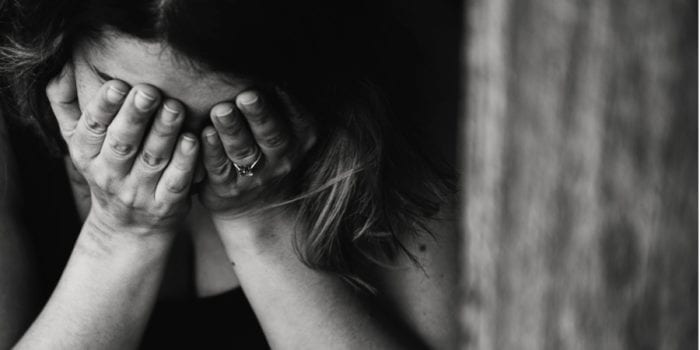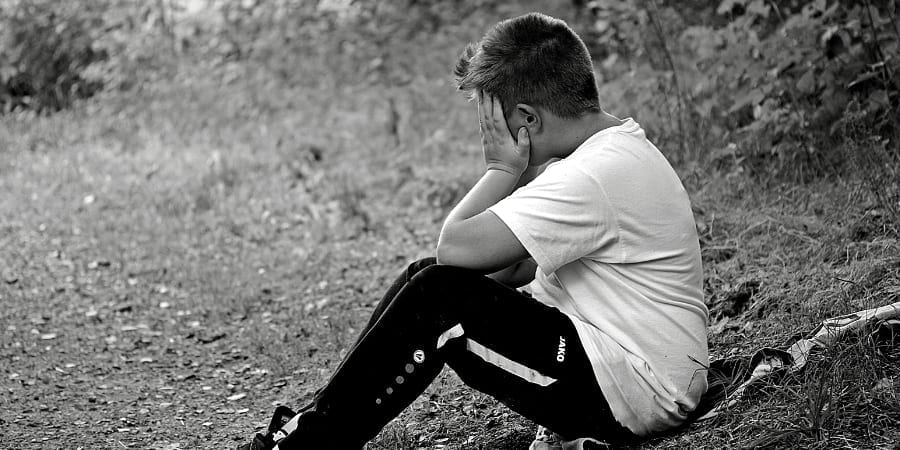Guest Post by Jennifer Audette
When your son or daughter is ill, our instinct as mamas is to hug them and do everything in our power to make sure they get better.
But what if you do all that and they still aren’t?
What if everything you know and feel still isn’t helping? What if there isn’t a blood test or X-ray that will give you answers? No doctor or fellow parent to say, “Ah yes, these symptoms mean he’s got ABC Disorder.”
That’s the dark, lonely path we began to walk with our son at the end of 2018.
What we thought but didn’t know for sure was that our son was battling severe anxiety and defiance issues, and it manifested itself in a complete refusal to attend school, soccer practices, amusement parks – and other places he loves. He tried a new medicine and worked with a therapist, and we changed our parenting practices. We reassured, we gave him consequences, and then more severe consequences, we brought home makeup work, we circled the school parking lot, we hugged, we cried, we yelled, we talked about transferring schools or changing schedules, we tried to discover a trigger or triggers (Was he being bullied? Did a teacher say something?), we watched videos and read books about anxiety and coping skills, we gave incentives and special breakfasts or dinners, we held meetings with the guidance counselor, we dragged him to the car and dragged him out of the car.
For six weeks, we would pump up his spirit at night and explain the rules and then use everything in our parenting arsenal to get him dressed and to the car each morning. Aside from three half-days of school, to no avail.
At the beginning of the seventh week, we put in one last-ditch effort. We’ll hold him down and put his clothes on for him, we decided, and then we’ll drag him to the car, drive to school and if he refuses to get out, we’ll put his backpack on the ground, drag him out of the car, lock the doors and make a run for it. He’d have to cut through the anxiety and figure it out. Tough love. I’m laughing now reading this: Never underestimate the strength of a 75-pound, anxious, distraught, depressed, determined and defiant 12-year-old.
This was a lot easier when he was 2 years old. After three minutes, we were out of breath and frustrated and distraught and at our wits’ end – and he was still in his underwear.

So with very little knowledge about what to look for, we sought out an intense behavioral health program. We found one nearby that would admit him. He went for six hours of intensive therapy every day for three and a half weeks. He came home every afternoon, and toward the end of the program, practiced going to classes at school as part of his exposure therapy. As I write this, we’re seven weeks out from his discharge day and though there have been some very rough setbacks, he’s missed 2½ days of school and two soccer practices in those seven weeks.
The behavioral health program seems to have been a major turning point, and he now knows that anxiety is something he will likely deal with for several more years, if not for the rest of his life. He knows each day will get easier, and we know as parents that life is never a straight line for those with mental health issues. Some weeks are great, others you pray hard for him to push through.
You’re probably wondering what the final straw was for us. I hope this helps other parents, as every parent, teacher, guidance counselor and co-worker who told us, “it will get better” or “stay strong” made an impact on me and helped keep me going when I wasn’t sure if I could.
Here were the signs for us that he needed more help than medicine, weekly therapy sessions and stricter parenting could provide:
DARKNESS. Our son went from anxious to depressed after a few weeks. He became frustrated about not being able to move past the anxiety and started beating himself up about it. The negative self-talk was terribly hard to hear and was a sign to us that things had grown beyond our control.
FATIGUE. As the anxiety and defiance and depression grew worse and he’d been stripped of many of the things he enjoyed doing (responsibilities before privileges), he’d resort to sleeping. A lot. He’d gladly forego electronics, books and toys to not have to go the places he was uncomfortable going. Instead, he’d just fall asleep for hours not so long after he woke up. That was bad.
RELIEF. It was like a switch. One second he was petrified and lifeless and then once we’d tried everything we could and had nothing left physically and emotionally to get him through the school doors, you’d notice an immediate change. He was so noticeably relieved it was as if a different child had entered the car or room. He needed to be that happy and content child 24/7, not just part-time. We often woke up in the middle of the night, planning and wondering how we could make that happen.
NO OTHER OPTIONS. Our son already was on medicine and was starting a new one, was seeing a therapist, had spoken regularly to his guidance counselor, was getting regular exercise, had many supportive friends. We had spoken with local law enforcement as well as the school resource officer and were told there was little they could do to help us in our efforts, unless our son became physically aggressive with us. We needed to take it to another level, and there weren’t many levels remaining.
Some children (including our son) may need even more than a partial hospitalization at a behavioral health hospital. Do not be afraid to voluntarily Baker Act your child, adolescent or teen. Check into what options there are for intensive outpatient, partial hospitalization or inpatient behavioral health therapy in your state. The expense and time will be worth it. And if there is a serious relapse (rare once the whole family is on the right path but certainly possible), then do it all again if you have to. Some issues, such as eating disorders and trichotillomania, need extra time to reverse behaviors that have become such a big part of the child’s life. That doesn’t necessarily mean the program failed or you failed. It’s just part of the journey.
Regardless of what works best for your child, this journey is tough for everyone involved: mom, dad, siblings and grandparents.
Here’s what continues to help me as we parent a child with anxiety and defiance issues:
YOU’RE OK. Mental health issues have a way of eating away at a family. Depression breeds depression, anxiety breeds anxiety. It’s so easy to get caught up in OCD behaviors, picky eating behaviors, fears, but don’t let that happen. Separate yourself. Provide a boundary. “I love you and support you, but this is your battle to fight, not mine.”
OR MAYBE NOT. Maybe you need therapy as well. You need to be healthy in order to support your child being healthy. Mental health issues run in families. Now’s a great time to get your anxiety, your self-image issues under control. Besides, what better role model for your child’s successful mental health journey than Mom or Dad?
NURTURE YOUR MARRIAGE. Dealing with a severely ill child strains a marriage. There are so many decisions: treatments, discipline, who stays home, who’s missing work, costs of medicine, costs of therapy, costs of doctors. And the unknown. You can’t prepare for a meltdown. Not being able to plan for a bad day is stressful. Don’t take that out on each other. To be honest, if you two are stressed, that only exacerbates illnesses, like OCD, ADHD, Tourette syndrome, anxiety and depression. So even if your child has had a rough day, have some child-free time together: Run an errand, get some ice cream, go out with another couple. Hearing other parents share crazy stuff their children tried to get away with is very therapeutic.

ASK ABOUT FAMILY LEAVE. I am so grateful to currently be on intermittent Family and Medical Leave. On meltdown mornings or when there’s a therapy appointment smack in the middle of the day, I have the peace of mind that I can be both a good mom and a loyal employee.
BE CAREFUL WHERE YOU GET YOUR ANSWERS. Get your instructions and expertise straight from a professional, whenever possible. While the Internet is a great place to find support and learn what options exist, it can be a scary place when you are desperately seeking answers. You’re going to easily find horror stories about the medicine your child is on and testimonies from parents who found great success when they removed their children from the sports, school, activity or event their child was scared to go to. That makes perfect sense if there is bullying or ineptitude but not so much when anxiety or defiance are wreaking havoc. Avoidance doesn’t solve the issue, and there are enough tales of avoidance on the Internet to make you strongly consider giving in yourself.
CREATE A NETWORK. Get support, mostly from parents who have been there before and can cheer you on during your journey. As I was driving 75 mph down the highway for Day No. 2 at the behavioral health hospital with a frantic, mostly naked 12-year-old grabbing at my steering wheel, my stepmother-in-law called to say, “Just keep driving, mama.” A colleague I highly respect put her son through the same behavioral health program and I leaned heavily on her the first week there: “Is this expected?” I kept asking her. And then there was the mom at the hair salon who walked in on me sharing one of our darker setback days, when both my husband and I felt like failures. Having never before met us or privy to our particular situation, she still was not at all horrified by the tough-love scenario I described. “I would have done the same thing,” she told me, unsolicited. I got a little choked up in the salon chair. You feel so alone on most days, so it’s important to remember there are lots of people cheering you – and your child – on.
I wrote this article to show my support for you. Whatever your son or daughter is going through, you’ve got this. Even if you don’t have all the answers, you know how to find them. Be a strong advocate for mental wellness, for the need for high-quality school psychologists and guidance counselors, for anti-bullying measures and bullying consequences. Be a strong and consistent parent, during an overwhelming trend toward rescue parenthood and friendship parenthood (I lived in both of those camps, so I should know.).
You are resilient.
You are wise.
But mostly, you are not alone.
Health + Wellness Guide
Check out our Health and Wellness Guide for Lakeland + Polk County to find dentists, orthodontists, doctors, hospitals, mental health, and learn more about health care options in our community.
About the Author: Jennifer Audette
Jennifer Audette lives in Lakeland with her husband, Scott, and two sons.



